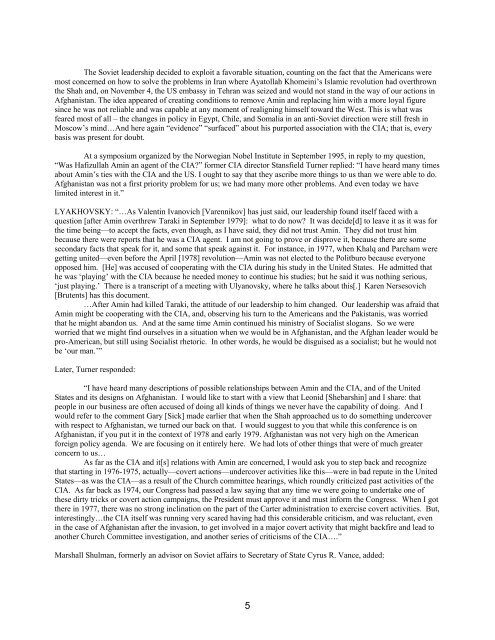Aleksandr Antonovich Lyakhovskiy Working Paper pp - Woodrow ...
Aleksandr Antonovich Lyakhovskiy Working Paper pp - Woodrow ...
Aleksandr Antonovich Lyakhovskiy Working Paper pp - Woodrow ...
Create successful ePaper yourself
Turn your PDF publications into a flip-book with our unique Google optimized e-Paper software.
The Soviet leadership decided to exploit a favorable situation, counting on the fact that the Americans were<br />
most concerned on how to solve the problems in Iran where Ayatollah Khomeini’s Islamic revolution had overthrown<br />
the Shah and, on November 4, the US embassy in Tehran was seized and would not stand in the way of our actions in<br />
Afghanistan. The idea a<strong>pp</strong>eared of creating conditions to remove Amin and replacing him with a more loyal figure<br />
since he was not reliable and was capable at any moment of realigning himself toward the West. This is what was<br />
feared most of all – the changes in policy in Egypt, Chile, and Somalia in an anti-Soviet direction were still fresh in<br />
Moscow’s mind…And here again “evidence” “surfaced” about his purported association with the CIA; that is, every<br />
basis was present for doubt.<br />
At a symposium organized by the Norwegian Nobel Institute in September 1995, in reply to my question,<br />
“Was Hafizullah Amin an agent of the CIA” former CIA director Stansfield Turner replied: “I have heard many times<br />
about Amin’s ties with the CIA and the US. I ought to say that they ascribe more things to us than we were able to do.<br />
Afghanistan was not a first priority problem for us; we had many more other problems. And even today we have<br />
limited interest in it.”<br />
LYAKHOVSKY: “…As Valentin Ivanovich [Varennikov] has just said, our leadership found itself faced with a<br />
question [after Amin overthrew Taraki in September 1979]: what to do now It was decide[d] to leave it as it was for<br />
the time being—to accept the facts, even though, as I have said, they did not trust Amin. They did not trust him<br />
because there were reports that he was a CIA agent. I am not going to prove or disprove it, because there are some<br />
secondary facts that speak for it, and some that speak against it. For instance, in 1977, when Khalq and Parcham were<br />
getting united—even before the April [1978] revolution—Amin was not elected to the Politburo because everyone<br />
o<strong>pp</strong>osed him. [He] was accused of cooperating with the CIA during his study in the United States. He admitted that<br />
he was ‘playing’ with the CIA because he needed money to continue his studies; but he said it was nothing serious,<br />
‘just playing.’ There is a transcript of a meeting with Ulyanovsky, where he talks about this[.] Karen Nersesovich<br />
[Brutents] has this document.<br />
…After Amin had killed Taraki, the attitude of our leadership to him changed. Our leadership was afraid that<br />
Amin might be cooperating with the CIA, and, observing his turn to the Americans and the Pakistanis, was worried<br />
that he might abandon us. And at the same time Amin continued his ministry of Socialist slogans. So we were<br />
worried that we might find ourselves in a situation when we would be in Afghanistan, and the Afghan leader would be<br />
pro-American, but still using Socialist rhetoric. In other words, he would be disguised as a socialist; but he would not<br />
be ‘our man.’”<br />
Later, Turner responded:<br />
“I have heard many descriptions of possible relationships between Amin and the CIA, and of the United<br />
States and its designs on Afghanistan. I would like to start with a view that Leonid [Shebarshin] and I share: that<br />
people in our business are often accused of doing all kinds of things we never have the capability of doing. And I<br />
would refer to the comment Gary [Sick] made earlier that when the Shah a<strong>pp</strong>roached us to do something undercover<br />
with respect to Afghanistan, we turned our back on that. I would suggest to you that while this conference is on<br />
Afghanistan, if you put it in the context of 1978 and early 1979. Afghanistan was not very high on the American<br />
foreign policy agenda. We are focusing on it entirely here. We had lots of other things that were of much greater<br />
concern to us…<br />
As far as the CIA and it[s] relations with Amin are concerned, I would ask you to step back and recognize<br />
that starting in 1976-1975, actually—covert actions—undercover activities like this—were in bad repute in the United<br />
States—as was the CIA—as a result of the Church committee hearings, which roundly criticized past activities of the<br />
CIA. As far back as 1974, our Congress had passed a law saying that any time we were going to undertake one of<br />
these dirty tricks or covert action campaigns, the President must a<strong>pp</strong>rove it and must inform the Congress. When I got<br />
there in 1977, there was no strong inclination on the part of the Carter administration to exercise covert activities. But,<br />
interestingly…the CIA itself was running very scared having had this considerable criticism, and was reluctant, even<br />
in the case of Afghanistan after the invasion, to get involved in a major covert activity that might backfire and lead to<br />
another Church Committee investigation, and another series of criticisms of the CIA….”<br />
Marshall Shulman, formerly an advisor on Soviet affairs to Secretary of State Cyrus R. Vance, added:<br />
5

















